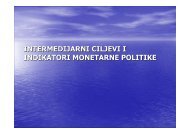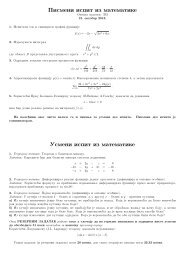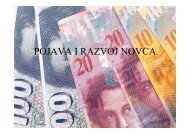WHITE BOOK 2004 EBU Tournament Directors' Guide Edited by ...
WHITE BOOK 2004 EBU Tournament Directors' Guide Edited by ...
WHITE BOOK 2004 EBU Tournament Directors' Guide Edited by ...
You also want an ePaper? Increase the reach of your titles
YUMPU automatically turns print PDFs into web optimized ePapers that Google loves.
White Book – November 2003 – Chapter V<br />
40.1.4 Auctions which suggest a player does not have his or her bidding<br />
Some examples of types of auctions in which it is clear that the last caller may have a<br />
hand materially different from that which the auction to date has suggested:<br />
(a) most auctions in which a player either passes when the partnership<br />
agreements require a bid, or bids when the partnership agreement requires<br />
a redouble;<br />
(b) most auctions in which a player has bid two or more suits, has been given<br />
preference <strong>by</strong> partner, been doubled for penalties, and bids another suit.<br />
Of course a partnership agreement (which may be implicit, eg following repetitions of<br />
such incidents) relating to such an action is likely to be unauthorised, and so may give<br />
rise to an adjusted score (see Orange book).<br />
40.1.5 L&EC procedures on psyching<br />
The L&EC reviews psyches, misbids or deviations reported to it <strong>by</strong> TDs. If their initial<br />
review suggests a change to the classification from Green, or from Amber to Red, then,<br />
before the L&EC determines the new classification, the players are invited to explain<br />
their actions.<br />
40.1.6 Misbidding a strong artificial opening<br />
While a psychic strong artificial 2 opening is not permitted (see Orange book) a player<br />
who makes a strong call on an unsuitable hand with no intention to deceive has not<br />
psyched. However, if the hand is not "strong" <strong>by</strong> the definitions of permitted<br />
conventions in the Orange book but is understood <strong>by</strong> the player to be a 2 opening<br />
then the player has used an illegal convention.<br />
Example A player opens 2 because he has nine solid spades and no other high<br />
cards saying that he wants to be in game. If his partner and he consider<br />
this the correct opening then it is not a Strong hand (see Definitions in the<br />
Orange book). He has not psyched but is playing an illegal system, and will<br />
receive A– (unless he does worse than that on the board – see #90.4.2)<br />
40.1.7 Opening 1NT with a singleton<br />
The L&EC expects an opening 1NT with a singleton to be recorded and classified as a<br />
psyche or deviation whenever the TD finds sufficient evidence of intent.<br />
This does not apply to a pair who opens 1NT if it falls within their agreements as to<br />
range and type of singleton.<br />
Example A player opens 1NT with 11 HCP, a 4441 hand and a singleton ten in clubs.<br />
This will be treated as a psyche if the pair does not allow a singleton, or the<br />
singleton should systemically be a high honour, or their range is 12-14.<br />
However if they play 11-14 and allow a singleton of any size then it is not a<br />
psyche.<br />
If they play it as 11-14 HCP, and singleton queen or better then it would be<br />
ruled as a deviation.<br />
40.2 Disclosure of system<br />
The regulations for Convention cards, Alerting and the general approach to Disclosure<br />
are included in the Orange book.<br />
41





